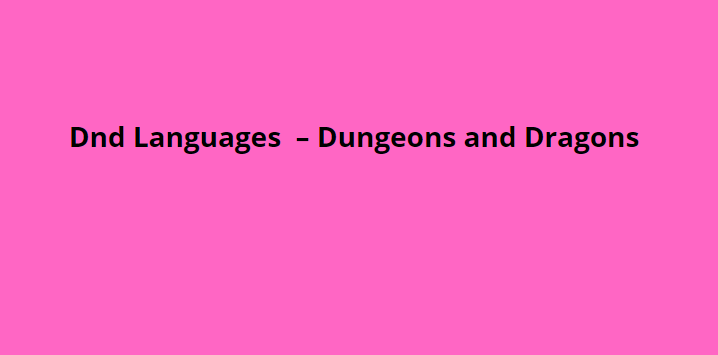Our acquaintance with Dnd Languages allows us to explain a great deal about them. You should read this post if you wish to learn the answers to all of these frequently asked questions and obtain. A list of lists with scripts to help you participate in your dungeons and dragons role-playing game. With joy and improve your communication skills. Like me, you’ll be enchanted with this site as well.
Languages of the DND
The language your character can speak by default is determined by your race. While your background can give you access to one or more additional languages. You should list these languages in your character sheet. Alternatively, use a widely used language or one from the table of Standard Languages.
A secret language like thieves’ cant or the tongue of a druid can be used with permission from your GM instead, such as an Exotic Languages table. Several of these languages are linguistic families, which means they have a wide range of regional dialects within them as well.
| LANGUAGE | TYPICAL SPEAKERS | SCRIPT |
| abyssal | Demons, Chaotic Evil Outsiders | Infernal |
| 2. Aquan | Water-Based Creatures | Dwarvish |
| 3. Auran | Air-Based Creatures | Dwarvish |
| 4. Celestial | Celestials (Angels, Devas) | Celestial |
| 5. Common | Humans, Halflings, Half-elves, Half-orcs | Common |
| 6.Deep Speech | Mind Flayers, Beholders | – |
| 7. Draconic | Kobolds, Troglodytes, Lizardfolk, Dragons, Dragonborn | Draconic |
| 8. Druidic | Druids (only) | Druidic |
| 9. Dwarvish | Dwarves | Dwarvish |
| 10. Elvish | Elves | Elvish |
| 11. Giant | Giants, Ogres | Dwarvish |
| 12. Gnomish | Gnomes | Dwarvish |
| 13. Goblin | Goblinoids, Hobgoblins, Bugbears | Dwarvish |
| 14. Gnoll | Gnolls | – |
| 15. Halfling | Halflings | Common |
| 16. Ignan | Fire-Based Creatures | Dwarvish |
| 17. Infernal | Devils, Tieflings | Infernal |
| 18. Orc | Orcs | Dwarvish |
| 19. Primordial | Elementals | Dwarvish |
| 20. Sylvan | Fey creatures (Dryads, Brownies, Leprechauns) | Elvish |
| 21. Terran | Xorns and Other Earth-Based Creatures | Dwarvish |
| 22.Undercommon | Drow, Underdark Traders |
Dungeons & Dragons utilizes a variety of dialects in promotional language to incorporate some of the elemental planes into a monster. The core of the family languages are these dialects. This is a new kind of information, designed for people who speak different dialects of the same language and want to converse easily.
Standard Languages
In the Standard Languages table, you can select all the languages you will use in your campaign or pick one. In addition, you can choose a speech or secret language, such as thieves’ cant or druid’s tongue, with the approval of your GM. Many languages have dialects and can be categorized into different families. The primordial languages include languages from the four elemental planes, such as Auran, Aquan, Ignan, and Terran. It is possible to converse with people from different dialects of the same language, however.
Additionally, standard languages are so widely used that players should not be surprised if they encounter one. A group with various races, whether human or not, is capable of choosing a language. A player shouldn’t have much trouble learning or understanding any of these languages if they don’t play in a custom setting or campaign where the Dungeon Master (DM) says otherwise. The following languages are most often used in 5th edition Dungeons & Dragons. D&D players can use these speeches on their character sheets or in their campaigns by referring to them in the speeches and scripts. Check them out now rather than waiting until the last minute.
Learning Guide
To address this, I will use the fifth edition rules, which are the most widely used today. I have also used this edition most recently. During the creation of your character, you will have a number of languages available to you. When you start the game, your character’s race will automatically determine what languages they know; for example, elves will know Elvish. You may also be able to select other languages, depending on your choice of backdrop.
Languages can sometimes be acquired through classes. Druids, for instance, learn Druidic, a language initially available exclusively to Druids. For rogues, Thieves’ Cant, a language created by combining words from multiple languages, is another option.There’s a trick that can help you learn as many languages as possible.. A linguist is the name of the program, and it allows you to learn three languages.
A video game is no different from learning a language in real life. Once you have customized your character and begin playing, learning a language becomes a chore. It might take you several weeks or longer to learn the language in-game, depending on your level of intelligence. During your free time, you can find a native speaker who will tutor you if your DM permits it.



